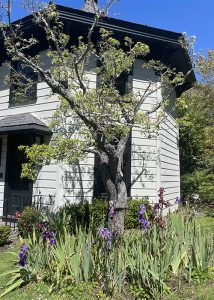Looking back and looking forward in honor of Black History Month, explore this sampling of podcasts, books, zoom lectures, articles, and TED talks. These rich resources are only an introduction to the many ways in which Black academics, leaders, community-organizers, scientists, and innovators have influenced and continue to drive change across the intersectional plant- and land-based spaces of agriculture, environmentalism, horticulture, landscape architecture, and botany.
Thanks to Kate Small, Gardener, for compiling these links
On Farming & Food Justice
On February 9th, Cal Ag Roots, a project of the California Institute for Rural Studies, premiered a 6-part podcast miniseries titled “We Are Not Strangers Here: African American Histories in Rural California.” The series spans from the experiences of early black settlers through Black land stewardship today. Episodes 1 and 2 are available now. New episodes to be released weekly. Listen here.
Dr. Monica M. White’s Freedom Farmers: Agricultural Resistance and the Black Freedom Movement, through profiles of influential figures, explores Black agrarianism as self-reliance, community building, and activism from the 1960s onward. White is an associate professor of environmental justice, urban agriculture, and community food systems at the University of Wisconsin-Madison. Watch her keynote speech at the 14th Annual Chicago Food Policy Summit here.
On Environmentalism & Outdoor Recreation
In Black Faces, White Spaces: Reimagining the Relationship of African Americans to the Great Outdoors, Carolyn Finney analyzes the complicated, historically-informed relationships many African Americans experience with the environment and with environmental discourse. You can take a look at Finney’s talk, “Black Faces, White Spaces: Christian Cooper, John Muir, & (Re)claiming a Green World,” facilitated last year by the New York Botanical Garden, here.
Code Switch, an NPR podcast now in its fifth year, facilitates complex conversations about race. Episode 2, “Being Outdoorsy When You’re Black or Brown,” unpacks the stereotype that people of color are not interested in the outdoors and spotlights Outdoor Afro, a non-profit connecting Black people with nature and outdoor leadership since 2009. Listen here.
On Horticulture & Designing Landscapes
Marylynn Mack, COO of South Coast Botanic Garden and Vice President of the American Public Gardens Association, is a leader in public horticulture and in guiding inclusion, diversity, equity, and accessibility initiatives. Listen to her podcast interview on Cultivating Place here.
Author and podcaster Jennifer Jewell’s book The Earth in Her Hands profiles several notable women of color working in horticultural fields.
Get a copy here!
Walter Hood is the founding director of Oakland-based Hood Design Studio, a UC Berkeley professor, and co-editor of the new essay collection, Black Landscapes Matter. He is well known for his work on the Bayview Opera House in San Francisco in 2016, and the ongoing renovation of the Oakland Museum of California’s gardens, both projects that emphasize access and community interfaces. Work is currently underway on his firm’s design of the International African American Museum in Charleston, South Carolina. Set to open in 2022, the museum is sited at Gadsden’s Wharf, where approximately forty percent of enslaved Africans initially arrived in the United States. Watch Hood’s 2018 TED Talk, “How Urban Spaces Can Preserve History and Build Community,” here and get a look at an in-depth explanation of the IAAM design process here.
Horticulturist and landscape designer Wambui Ippolito develops programs and lectures on how the Black diaspora has shaped American gardens. Register for Ippolito’s upcoming February 23rd lecture, “Black Cornerstone of the American Landscape,” hosted by the Missouri Botanical Garden, here. You can listen to Ippolito’s interview with Jennifer Jewell here.
On Botany & Ecology
Last year, Tanisha Williams launched #BlackBotanistsWeek to facilitate community among black plant lovers and inspire others to pursue botanical careers. Read an interview with Williams here. The Holden Arboretum, in partnership with the Black Botanists Week committee members, is currently hosting a year-long lecture series, Growing Black Roots: The Black Botanical Legacy. Check out presenter bios and content summaries, access links to past lectures, and register for upcoming lectures—hosted the second Wednesday of each month through September—here.





